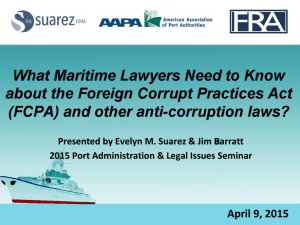Evelyn Suarez was heavily quoted in a recent article posted on the International Bar Association website entitled “US-Africa trade: time for a rethink.” Excerpts from the article appear below, for the full text please visit the IBA website.
The value of US trade with Africa is declining, while China’s is booming. Global Insight analyses why the US is struggling to trade on a large scale with Africa and assesses what impact the Ebola outbreak has had.


 On November 27, 2014, the World Trade Organization (WTO) was finally able to overcome an impasse created by India in July which prevented implementation of the Trade Facilitation Agreement reached in Bali in December 7, 2013. As described by WTO Director General (DG) Azevedo, “the impasse related to the political link between two of the Bali decisions – the decision on Public Stockholding for Food Security Purposes, and the Trade Facilitation Agreement.” The WTO General Council was able to address India’s objections after a breakthrough made by the U.S. and India on November 13, 2014 to simultaneously adopt the protocol necessary to implement the TFA and a decision clarifying the terms of an existing food security “peace clause.”
On November 27, 2014, the World Trade Organization (WTO) was finally able to overcome an impasse created by India in July which prevented implementation of the Trade Facilitation Agreement reached in Bali in December 7, 2013. As described by WTO Director General (DG) Azevedo, “the impasse related to the political link between two of the Bali decisions – the decision on Public Stockholding for Food Security Purposes, and the Trade Facilitation Agreement.” The WTO General Council was able to address India’s objections after a breakthrough made by the U.S. and India on November 13, 2014 to simultaneously adopt the protocol necessary to implement the TFA and a decision clarifying the terms of an existing food security “peace clause.” On January 21, 2014, the White House announced the first U.S.-Africa Leaders Summit in Washington, DC to take place on August 5 and 6, 2014. President Obama invited leaders from across the African continent with the aim of strengthening ties with one of the world’s most dynamic and fastest-growing regions. Six of the world’s ten fastest growing economies of the past decade are in sub-Saharan Africa. According to the White House Press Release, “[t]he Summit will build on the progress made since the President’s trip to Africa last summer, advance the Administration’s focus on trade and investment in Africa, and highlight America’s commitment to Africa’s security, its democratic development, and its people.”
On January 21, 2014, the White House announced the first U.S.-Africa Leaders Summit in Washington, DC to take place on August 5 and 6, 2014. President Obama invited leaders from across the African continent with the aim of strengthening ties with one of the world’s most dynamic and fastest-growing regions. Six of the world’s ten fastest growing economies of the past decade are in sub-Saharan Africa. According to the White House Press Release, “[t]he Summit will build on the progress made since the President’s trip to Africa last summer, advance the Administration’s focus on trade and investment in Africa, and highlight America’s commitment to Africa’s security, its democratic development, and its people.”